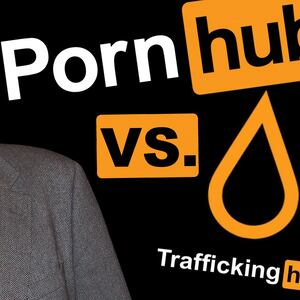Oregon is home to a lot of adult-entertainment or XXX venues: drag and fully nude strip clubs, some lingerie modeling or “peep show” type venues, and a few sex clubs. People here in Portland like to brag (or complain) that our city hosts “the most strip clubs per capita” and, as a full-time stripper for the last decade, I can confirm that adult entertainment industry workers and our families comprise a major chunk of the statewide population and economy.
So when notoriously anti-porn and anti-sex work writer Nick Kristof announced his upcoming run for Oregon governor, a lot of my friends and industry peers recognized the red flags.
Nick Kristof—who wrote a column for The New York Times for two decades before he resigned to run for office—is one of those well-respected media people who has a personal disdain for consensual sex work. Some mainstream news outlets applaud him as an anti-trafficking expert—he has filmed and spotlighted abuses and shared them publicly while condemning all sexual labor—despite defending sweatshops. He has repeatedly misidentified porn platforms as the most-utilized websites for child sexual abuse material and named anti-porn evangelist Laila Mickelwait as a credible source on anti-trafficking.
“Kristof truly sees himself as a savior of women who are trafficked, but he has not bothered to understand the nuance or complexity of people’s lived experience and the systemic inequities that foster exploitation.” says Melissa Broudo, legal director of National Advocacy Org to Decriminalize Sex work.
If you support actions like shutting down venues, banning adult listing websites, or outing us to the mainstream, you make us poorer and our lives more endangered and scrutinized. This is how some folks like Kristof directly harm the populations they purport to care about, and are publicly applauded for it.
“This removed analysis only serves to harm the very people he alleges to support and arrogance cannot bode well for him in a policy-making or governing role,” Broudo adds.
At a time when Oregonians are preparing a ballot measure that would decriminalize prostitution-related offenses, it is crucial that any sitting governor would have literacy about the differences between sex work and trafficking, and about how criminalization and stigma leads to harm of all peoples in the community.
When recently asked by a local Oregon journalist about decriminalization, Kristof said, “I do think that there has to be a greater effort to assert order and also norms.”
Kristof is a supporter of arresting clients, not sex workers themselves, referred to as the Nordic Model, or “End Demand” model of partial criminalization. All partial criminalization models waste money and make it harder to address assaults, rapes, and thefts of payment, which are harmful crimes against consent that all people and especially sex workers and people in exploitative circumstances might experience. Last year, Portland Police spent 85 percent of their Human Trafficking Unit arrests on charges related to prostitution, and even misidentified some of the arrestees in the media as having engaged in “sex trafficking.” The current approaches are inhumane, costly, and ineffective.
Factually, even if you don’t like or respect what I choose to do for a living, criminalizing and restricting consensual adult sex work leads to worse public health outcomes. This has been shown by decades of research by human rights-focused organizations like Amnesty International , the World Health Organization, the ACLU, and by public health experts from Johns Hopkins University, the University of Nevada-Las Vegas, and the American Association for Sexuality Educators, Counselors and Therapists.
Why are some people anti-porn? Sexological experts know that some folks were raised to believe that people who get naked with each other and for money are sinners or mentally ill. Some people are anti-porn because of their classist views on physical laborers. Some people have personal trauma bad experiences related to sex media. Some people have trauma around men/strangers and couldn’t imagine being able to consensually transact with them, and feel OK about it. And a lot of folks have been raised by mainstream media to believe we are victims, or villains.
“Kristof has exploited vulnerable people to inflate his ego for years; we don’t want a governor who supports legislation that will make sex trafficking more common,” says OSWC co-chair and public health student Bianca Beebe.
“Choice,” in the context of capitalism, is key here. Choosing sex work, and different types of it, has changed my life for the better. Students rely heavily on the option of doing sex work. People seek out sex work because there is the potential to benefit from flexible scheduling and potentially lucrative earnings in a short period of time—giving them the tools to escape abusive family, relationships, or exploitative “normie” jobs.
And yet, some people still hate that the sex industries exist, and seek to abolish them and the people in them. It is common opponents of sex work to support restrictions that hurt or endanger sex workers or their clients, under the guise of “fighting exploitation.”
So what can we do? “Prepare to mobilize counter actions in multiple forms. Protests, legal, petitions and social media,” says organizer Mistress Bruja,
Of Kristof and his foray into politics, she adds, “His perfect world is one where sex work doesn’t even exist. I shudder to think of the opportunities he’ll take in order to backtrack protections for sex workers, we are expendable to him. Nick Kristof is dangerous.”
Elle Stanger is an AASECT Certified Sex Educator, podcast host and co-chair of the Oregon Sex Workers Committee in Portland, Oregon.







